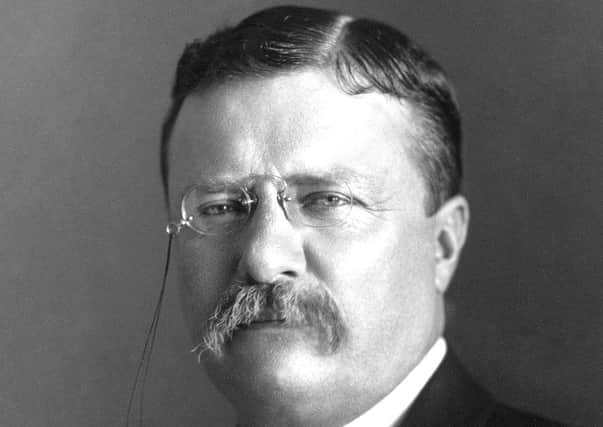US President of Ulster Scots heritage who revelled in the great outdoors


Sometimes older parishioners reminisce with me about their bygone childhood days when they walked quite long distances through the countryside, come rain or shine, to church on Sunday mornings, home again for lunch, back to the church for afternoon Sunday school, back home for tea, and then back to church for evening service, and then, of course, back home again.
It sounds exhausting, but the memories recounted are never regretful of the routine.
Advertisement
Hide AdAdvertisement
Hide AdThis observation struck me as I read recently about the former US President, from 1901-1909, Theodore Roosevelt, who died 100 years ago this month, on January 6.
Roosevelt, who grew up as a member of a congregation in the Dutch Reformed tradition, reportedly at one stage in his life regularly walked all of three miles to church, and the three miles back home again.
On moving to Washington, he did not realise there was a Reformed congregation in his tradition there and consequently attended the Episcopal Church, with which the Church of Ireland is in communion, along with his Episcopalian wife. That is, until he discovered that there was indeed a small, unobtrusively situated church in the city reflecting his home congregation’s denominational allegiance, and he joined it.
However, at his private home in Cove Neck, on New York’s Long Island, he attended the Oyster Bay Episcopal church.
Advertisement
Hide AdAdvertisement
Hide AdRoosevelt, as well as being a man of faith, was apparently also fond of fitness and demanding exercise, including horseback riding, big game hunting, rowing and boxing.
This aspect of his personality is perhaps similar to that of the present-day, but very different, Russian President Vladimir Putin who is known to enjoy ‘macho’ activities.
By nature, the Republican Roosevelt might be described as having been a conservative with a nonetheless progressive inclination.
A committed conservationist who established vast acres of public lands and founded the US Forest Service in 1905, Roosevelt’s stance was one which today would encourage any true environmentalist.
Advertisement
Hide AdAdvertisement
Hide AdIn his book on Roosevelt, ‘The Wilderness Warrior’, the American academic Douglas Brinkley recounts how on a wintry morning in 1903 Roosevelt arrived excitedly at a White House cabinet meeting. Those present were sure some serious crisis had arisen but, referring to a bird that normally spent the winter in central America, Roosevelt told them: “Just now I saw a chestnut-sided warbler – and this is only February!”
Remembering Roosevelt, however, inevitably brings us not only to his religious and personal character but also to his political legacy.
As well as championing so-called Progressive Era policies which attempted to combat the ill-effects of industrialisation and corruption in public life, he won the Nobel Peace Prize in 1906 for having negotiated peace in the Russo-Japanese war when the belligerents met in Portsmouth, New Hampshire and, following difficult talks, signed a peace treaty in 1905.
Roosevelt’s Nobel honour was awarded also for his success in resolving a dispute with Mexico by means of arbitration.
Advertisement
Hide AdAdvertisement
Hide AdThe Nobel Prize organisation records, however, that the American president’s award was controversial, with commentators on the Left objecting to his military policies.
They say that American presidents all hunt for Irish roots.
Roosevelt’s mother reputedly had Ulster Scots ancestors who emigrated in the early 18th century from Gleno, Co Antrim.
As well as being a politician and outdoor action-man, Theodore Roosevelt was a very wide reader.
As the historian Elting Morison commented in his introduction to Roosevelt’s autobiography, he was “quite probably the only President who was familiar with the works of Topelius, a Finnish novelist”.
Advertisement
Hide AdAdvertisement
Hide AdRoosevelt was also a prolific writer of books on a wide range of topics, from history to biography to nature, as well as articles and letters, and was keenly interested in Irish affairs.
What can we learn today from Theodore Roosevelt’s life?
It was a life of faith and a life of concerned engagement with issues affecting ordinary people.
While criticized by liberals for an at times imperialistic attitude, he without doubt had a profound social conscience, strove for peace and cared deeply for the natural environment.
He knew personal tragedy, for his first wife died only four years after they were married, two days after giving birth, and on the same day as his mother. Yet he rose from his grief, threw himself into his work and gained the highest public office in America.
Canon Ian Ellis is a former editor of The Church of Ireland Gazette, which is editorially independent of the Church of Ireland.
He is also the current rector of Newcastle, Co Down.